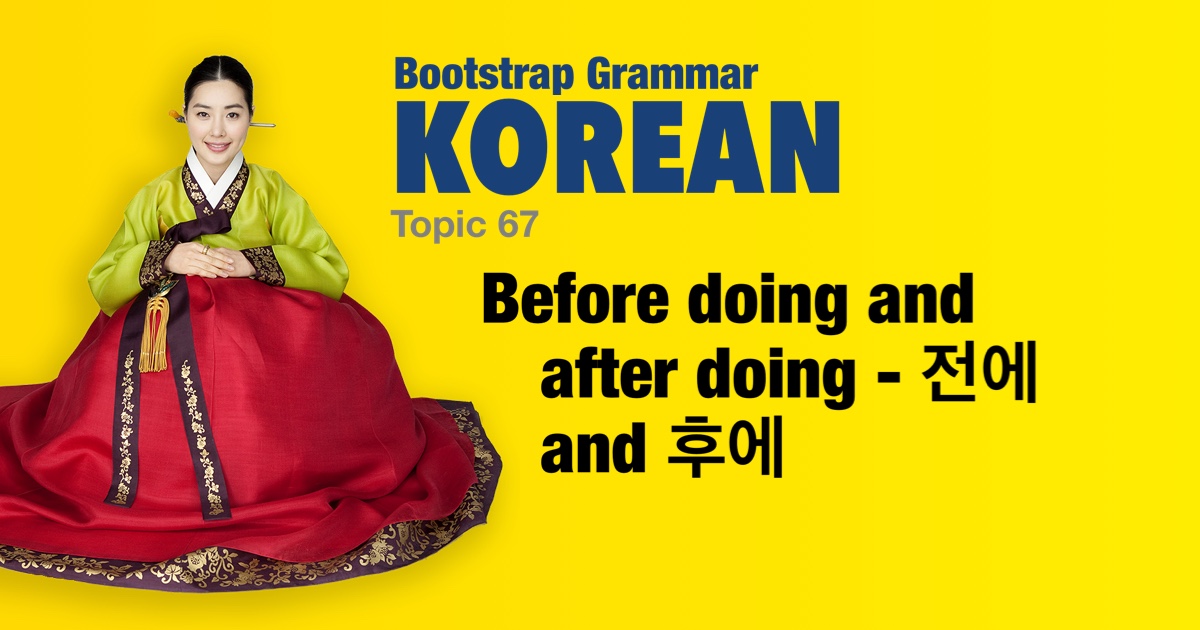Korean grammar - Before doing and after doing - 전에 and 후에 |
|||
|
|||
• The pattern Verb stem + 기 전에 means 'before' the verb happens. -- Verb stem + 기 is the normalised form of the verb. -- Note that generally only the present tense verb normalisation is used with 전에 even though the actions might occur in the past or future. • The pattern Verb stem + (으)ㄴ 후에 means 'after' the verb happens. -- Verb stem + (으)ㄴ is the past tense gerund form of the verb. -- 다음에 can also be used in place of 후에. The word 직 is often used before 전 and 후 to mean 'just before' or 'just after'. |
| Examples: | |
|
집에서 나가기 전에 방을 치울 거예요.
Before leaving the house (I) will clean my room. |
|
|
제가 아내와 결혼하기 전에 우리는 이 년 동안 사귀었어요.
Before I married my wife, we went out/dated for two years. |
|
|
수박을 먹기 직전에 사과를 먹었어요.
Just before (I) ate a watermelon I ate an apple.
|
|
|
식사하기 전에 항상 손을 씻어요.
(I) always wash my hands before eating. |
|
|
한국에 오기 직전에 저는 한국어를 배웠어요.
(I) learned Korean just before (I) came to Korea. |
|
|
경찰관이 오기 직전에 그 사람이 갔어요.
That person left just before the police came. |
|
|
저는 수업 직전에 숙제를 했어요.
I did my homework just before class. |
|
|
그는 한국에 가기 전에 한국어를 배울 것입니다.
Before going to Korea he will learn Korean. |
|
|
밥을 먹은 후에 친구를 만났어요.
After (I) ate, (I) met a friend. |
|
|
과자를 많이 먹은 후에 배가 아팠어요.
After eating a lot of candy/snacks, (my) stomach was sore. |
|
|
구두를 신은 다음에 의자에서 일어났어요.
After putting on my boots, (I) got up from the chair. |
|
|
그 책을 다 읽은 후에 저도 빌려주세요.
Please lend (me) that book after you have finished reading it. |
|
|
방을 치운 다음에 밖에 나갔어요.
After cleaning up (my) room, (I) went outside. |
|
|
숙제가 끝난 직후에 저는 집에 갈 거예요.
Right after (my) homework is finished, I will go home.
|
|
|
집에 도착한 후, 저는 샤워를 할 거예요.
After (I) arrive home, I will take a shower.
|
|
|
오늘 아침에 집을 나서기 전에 밥을 먹지 않았기 때문에 매우 배가 고파요.
This morning, because (I) didn't eat before (I) left home, (I) am very hungry.
|
|
 |
|



 It is not uncommon to drop the
It is not uncommon to drop the 